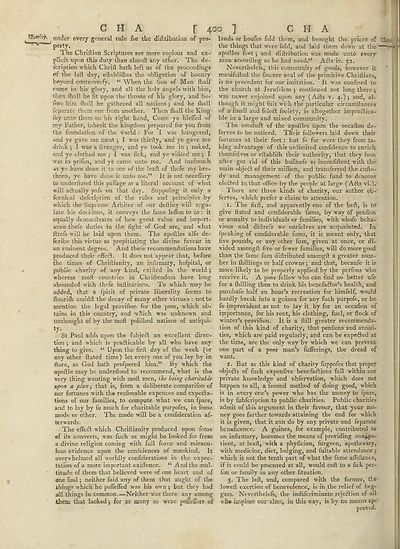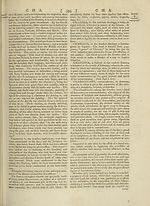Encyclopaedia Britannica, or, a Dictionary of arts, sciences, and miscellaneous literature : enlarged and improved. Illustrated with nearly six hundred engravings > Volume 5, BUR-CHI
(428) Page 400
Download files
Complete book:
Individual page:
Thumbnail gallery: Grid view | List view

mxrhf.
C H A [40
under every general rule for the diiliibutlon of pro*
pcrty.
The Chriftian Scriptures are more copious and ex-'
plicit upon this duty than almoft any other. The de-
Icription which Chriil hath left us tif the proceedings
ef the laft day, eftablithes the obligation of bounty
beyond controverfy. “ When the Son of Man (hall
come in his glory, and all the holy angels with him,
then fhall he lit upon the throne of his glory, and be¬
fore him lhall be gathered all nations 5 and he fhall
feparate them one from another. Then fhall the King
fay unto them on his right hand, Come ye blefled of
my Father, inherit the kingdom prepared for you from
the foundation of the world : For I was hungered,
and ye gave me meat j I was thirfly, and ye gave me
drink j I was a ftranger, and ye took me in ; naked,
and ye clothed me j I was lick, and ye vifited me; I
was in prifon, and ye came unto me. And inafmuch
as ye have done it to one of the leaf! of thefe my bre¬
thren, ye have done it unto me.” It is not neceflary
to underhand this paffage as a literal account of what
will actually pafs on that day. Suppofing it only a
fcenical defeription of the rules and principles by
which the Supreme Arbiter of our deftiny will regu¬
late his deciiions, it conveys the fame leffon to us : it
equally demonftrates of how great value and import¬
ance thefe duties in the fight of God are, and what
hrefs will he laid upon them. The apoftles alfo de-
feribe this virtue as propitiating the divine favour in
an eminent degree. And thele recommendations have
produced their effect. It does not appear that, before
the times of Chriftianity, an infirmary, hofpital, or
public charity of any kind, exifled in the world j
w'hereas molt countries in Chriftendom have long
abounded with thefe inflitutions. To which may be
added, that a fpirit of private liberality feems to
flourifh amidlt the decay of many other virtues : not to
mention the legal provifion for the poor, which ob¬
tains in this country, and which was unknown and
Unthought of by the moft polifhed nations of antiqui-
tY-
St Paul adds upon the fubjeft an excellent direc¬
tion and which is praflicable by all who have any
thing to give. “ Upon the firft day of the week (or
any other ftated time) let every one of you lay by in
ffore, as God hath profpered him.” By which the
apoftle may be underftood to recommend, what is the
very thing wanting with molt men, the being charitable
upon a plan; that is, from a deliberate comparifon of
our fortunes with the reafonable expences and expefta-
tions of our families, to compute what we can fpare,
and to lay by fo much for charitable purpofes, in fome
mode or other. The mode will be a confideration af¬
terwards.
The effeft which Chriftianity produced upon feme
ef its converts, was fuch as might be looked for from
a divine religion coming with full force and miracu¬
lous evidence upon the confciences of mankind. It
overwhelmed all worldly conftderations in the expec¬
tation of a more important exiftence. “ And the mul¬
titude of them that believed were of one heart and of
4>ne foul 5 neither faid any of them that aught of the
things which he poffeffed was his own *, but they had
all things in common.—Neither was there any among
them that lacked j for as many as were poffeilors of
o ] C H A
lands or houfes fold them, and brought the prices of Ckfi
the things that were fold, and laid them down at the ''““V
apoftles feet j and diftribution was made unto every
man according as he had need.” A£ls iv. 32.
Neverthelefs, this community of goods, however it '
manifefted the fincere zeal of the primitive Chriftians,
is no precedent for our imitation. It was confined to
the church at Jerufalem 5 continued not long there j
was never enjoined upon any (Adis v. 4.) j and, al¬
though it might fuit wi h the particular circumftances
of a fmall and feleft foeiety, is altogether impra&ica-
ble in a large and mixed community.
'The conduft of the apoftles upon the occafion de-
ferves to be noticed. Their followers laid down their
fortunes at their feet : but fo far were they from ta¬
king advantage of this unlimited confidence to enrich
themfelves or eftablifh their authority, that they foon
after got rid of this bufmefs as inconfiftent with the
main object of their mifiion, and transferred the cufto-
dy and management of the public fund to deacons
elefted to that office by the people at large (A£ts vi.).
There are three kinds of charity, our author ob-
ferves, which prefer a claim to attention.
1. The firft, and apparently one of the beft, is to
give ftated and confiderable fums, by way of penfton
or annuity to individuals or families, with whofe beha¬
viour and ditlrefs we ourfelves are acquainted. In
fpeaking of confiderable fums, it is meant only, that
five pounds, or any other fum, given at once, or di¬
vided amongft five or fewer families, will do more good
than the fame fum diftributed amongft a greater num¬
ber in (hillings or half crowns •, and that, becaufe it is
more likely to be properly applied by the perfons who
receive it. A poor fellow' who can find no better ufe
for a (hilling than to drink his benefa&or’s health, and
purchafe half an hour’s recreation for himfelf, would
hardly break into a guinea for any fuch purpofe, or be
fo improvident as not to lay it by for an occafion of
importance, for his rent, his clothing, fuel, or (lock of
winter’s provifion. It is a (fill greater recommenda¬
tion of this kind of charity, that penfions and annui¬
ties, which are paid regularly, and can be expeQed at
the time, are the only way by which we can prevent
one part of a poor man’s fufferings, the dread of
want.
2. But as this kind of charity fuppofes that proper
objefts of fuch expenlive benefactions fall within our
private knowledge and obfervation, which does not
happen to all, a fecond method of doing good, which
is in every one’s power who has the money to fpare,
is by fubfeription to public charities. Public charities
admit of this argument in their favour, that your mo¬
ney goes farther towards attaining the end for which
it is given, that it can do by any private and feparate
beneficence. A guinea, for example, contributed to
an infirmary, becomes the means of providing one*-pa-
tient, at leaft, with a phyfician, furgeon, apothecary,
with medicine, diet, lodging, and fuitable attendance j
which is not the tenth part of what the fame aftilUnce,
if it could be procured at all, would coft to a lick per-
fon or family in any other fituation.
3. The laft, and, compared with the former, the
lowed exertion of benevolence, is in the relief of beg¬
gars. Neverthelefs, the indiferiminate rejedion of all
who implore our alms, in this way, is by no means ap¬
proved.
C H A [40
under every general rule for the diiliibutlon of pro*
pcrty.
The Chriftian Scriptures are more copious and ex-'
plicit upon this duty than almoft any other. The de-
Icription which Chriil hath left us tif the proceedings
ef the laft day, eftablithes the obligation of bounty
beyond controverfy. “ When the Son of Man (hall
come in his glory, and all the holy angels with him,
then fhall he lit upon the throne of his glory, and be¬
fore him lhall be gathered all nations 5 and he fhall
feparate them one from another. Then fhall the King
fay unto them on his right hand, Come ye blefled of
my Father, inherit the kingdom prepared for you from
the foundation of the world : For I was hungered,
and ye gave me meat j I was thirfly, and ye gave me
drink j I was a ftranger, and ye took me in ; naked,
and ye clothed me j I was lick, and ye vifited me; I
was in prifon, and ye came unto me. And inafmuch
as ye have done it to one of the leaf! of thefe my bre¬
thren, ye have done it unto me.” It is not neceflary
to underhand this paffage as a literal account of what
will actually pafs on that day. Suppofing it only a
fcenical defeription of the rules and principles by
which the Supreme Arbiter of our deftiny will regu¬
late his deciiions, it conveys the fame leffon to us : it
equally demonftrates of how great value and import¬
ance thefe duties in the fight of God are, and what
hrefs will he laid upon them. The apoftles alfo de-
feribe this virtue as propitiating the divine favour in
an eminent degree. And thele recommendations have
produced their effect. It does not appear that, before
the times of Chriftianity, an infirmary, hofpital, or
public charity of any kind, exifled in the world j
w'hereas molt countries in Chriftendom have long
abounded with thefe inflitutions. To which may be
added, that a fpirit of private liberality feems to
flourifh amidlt the decay of many other virtues : not to
mention the legal provifion for the poor, which ob¬
tains in this country, and which was unknown and
Unthought of by the moft polifhed nations of antiqui-
tY-
St Paul adds upon the fubjeft an excellent direc¬
tion and which is praflicable by all who have any
thing to give. “ Upon the firft day of the week (or
any other ftated time) let every one of you lay by in
ffore, as God hath profpered him.” By which the
apoftle may be underftood to recommend, what is the
very thing wanting with molt men, the being charitable
upon a plan; that is, from a deliberate comparifon of
our fortunes with the reafonable expences and expefta-
tions of our families, to compute what we can fpare,
and to lay by fo much for charitable purpofes, in fome
mode or other. The mode will be a confideration af¬
terwards.
The effeft which Chriftianity produced upon feme
ef its converts, was fuch as might be looked for from
a divine religion coming with full force and miracu¬
lous evidence upon the confciences of mankind. It
overwhelmed all worldly conftderations in the expec¬
tation of a more important exiftence. “ And the mul¬
titude of them that believed were of one heart and of
4>ne foul 5 neither faid any of them that aught of the
things which he poffeffed was his own *, but they had
all things in common.—Neither was there any among
them that lacked j for as many as were poffeilors of
o ] C H A
lands or houfes fold them, and brought the prices of Ckfi
the things that were fold, and laid them down at the ''““V
apoftles feet j and diftribution was made unto every
man according as he had need.” A£ls iv. 32.
Neverthelefs, this community of goods, however it '
manifefted the fincere zeal of the primitive Chriftians,
is no precedent for our imitation. It was confined to
the church at Jerufalem 5 continued not long there j
was never enjoined upon any (Adis v. 4.) j and, al¬
though it might fuit wi h the particular circumftances
of a fmall and feleft foeiety, is altogether impra&ica-
ble in a large and mixed community.
'The conduft of the apoftles upon the occafion de-
ferves to be noticed. Their followers laid down their
fortunes at their feet : but fo far were they from ta¬
king advantage of this unlimited confidence to enrich
themfelves or eftablifh their authority, that they foon
after got rid of this bufmefs as inconfiftent with the
main object of their mifiion, and transferred the cufto-
dy and management of the public fund to deacons
elefted to that office by the people at large (A£ts vi.).
There are three kinds of charity, our author ob-
ferves, which prefer a claim to attention.
1. The firft, and apparently one of the beft, is to
give ftated and confiderable fums, by way of penfton
or annuity to individuals or families, with whofe beha¬
viour and ditlrefs we ourfelves are acquainted. In
fpeaking of confiderable fums, it is meant only, that
five pounds, or any other fum, given at once, or di¬
vided amongft five or fewer families, will do more good
than the fame fum diftributed amongft a greater num¬
ber in (hillings or half crowns •, and that, becaufe it is
more likely to be properly applied by the perfons who
receive it. A poor fellow' who can find no better ufe
for a (hilling than to drink his benefa&or’s health, and
purchafe half an hour’s recreation for himfelf, would
hardly break into a guinea for any fuch purpofe, or be
fo improvident as not to lay it by for an occafion of
importance, for his rent, his clothing, fuel, or (lock of
winter’s provifion. It is a (fill greater recommenda¬
tion of this kind of charity, that penfions and annui¬
ties, which are paid regularly, and can be expeQed at
the time, are the only way by which we can prevent
one part of a poor man’s fufferings, the dread of
want.
2. But as this kind of charity fuppofes that proper
objefts of fuch expenlive benefactions fall within our
private knowledge and obfervation, which does not
happen to all, a fecond method of doing good, which
is in every one’s power who has the money to fpare,
is by fubfeription to public charities. Public charities
admit of this argument in their favour, that your mo¬
ney goes farther towards attaining the end for which
it is given, that it can do by any private and feparate
beneficence. A guinea, for example, contributed to
an infirmary, becomes the means of providing one*-pa-
tient, at leaft, with a phyfician, furgeon, apothecary,
with medicine, diet, lodging, and fuitable attendance j
which is not the tenth part of what the fame aftilUnce,
if it could be procured at all, would coft to a lick per-
fon or family in any other fituation.
3. The laft, and, compared with the former, the
lowed exertion of benevolence, is in the relief of beg¬
gars. Neverthelefs, the indiferiminate rejedion of all
who implore our alms, in this way, is by no means ap¬
proved.
Set display mode to:
![]() Universal Viewer |
Universal Viewer | ![]() Mirador |
Large image | Transcription
Mirador |
Large image | Transcription
Images and transcriptions on this page, including medium image downloads, may be used under the Creative Commons Attribution 4.0 International Licence unless otherwise stated. ![]()
| Permanent URL | https://digital.nls.uk/192989833 |
|---|
| Attribution and copyright: |
|
|---|
| Description | Ten editions of 'Encyclopaedia Britannica', issued from 1768-1903, in 231 volumes. Originally issued in 100 weekly parts (3 volumes) between 1768 and 1771 by publishers: Colin Macfarquhar and Andrew Bell (Edinburgh); editor: William Smellie: engraver: Andrew Bell. Expanded editions in the 19th century featured more volumes and contributions from leading experts in their fields. Managed and published in Edinburgh up to the 9th edition (25 volumes, from 1875-1889); the 10th edition (1902-1903) re-issued the 9th edition, with 11 supplementary volumes. |
|---|---|
| Additional NLS resources: |
|

